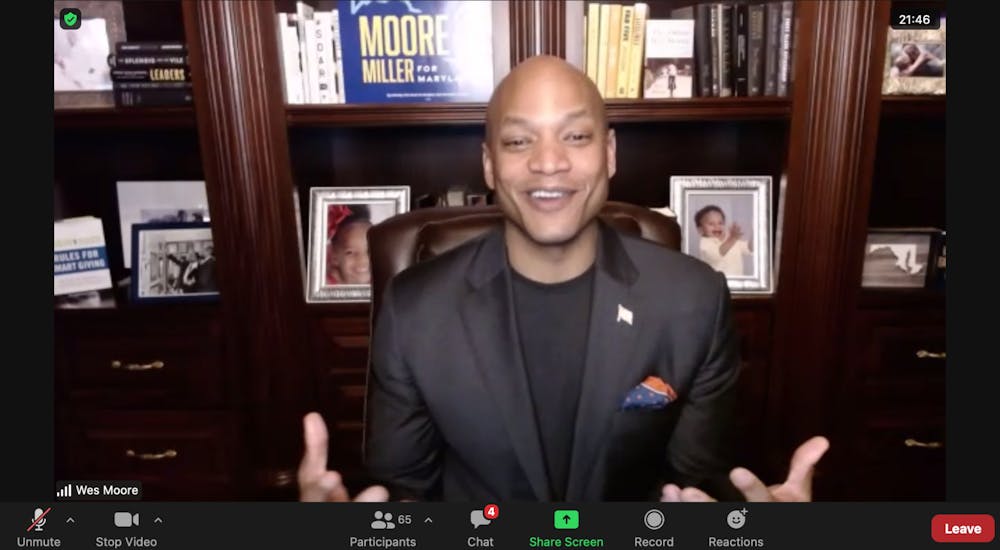Maryland gubernatorial primary candidate Wes Moore introduced his platform and views on Baltimore in a virtual meet-and-greet on Thursday, Feb. 17. Senior Isaac Frumkin, who is currently working on voter engagement for Moore’s campaign, hosted the event. Female Leaders of Color, the Black Student Union (BSU) and Hopkins Democrats were part of the conversation, with Professor of Political Science and Sociology Vesla Weaver introducing Moore.
Moore is a Hopkins alum who studied International Studies and Economics and graduated in 2001. He is the former CEO of the Robin Hood Foundation, a veteran and Rhodes scholar. This year, Moore is running for governor of Maryland with former State Representative Aruna Miller. Their campaign focuses on issues such as education, social justice and uplifting Black families.
Moore began by discussing how his experience at Hopkins shaped the trajectory of his life. He then broadened the conversation to Maryland, describing Maryland’s history of slavery, redlining, recidivism rates and incarceration. He emphasized the importance of analyzing and addressing the issues present in the community.
“We incarcerate more African American men between the ages of 18 and 25 than any other state in this country. We've got work to do if we're going to create equitable measures of opportunities for everybody,” he said. “Being able to embrace and understand our own history is a prerequisite in order in order for us to get there.”
Moore also highlighted opportunities for improving Baltimore’s infrastructure.
“Some of the best technology companies are being built right here in Baltimore, yet we have children who do not have wifi,” he said. “We have the best medical institutions, like Johns Hopkins University Hospital, where people will fly in from around the world to get treated, but people who live down the street from it cannot afford it.”
Moore elaborated on how his platform focuses on fundamentally addressing crime in Baltimore by investing in mental health services and community-led intervention.
“That will include everything from fixing a broken parole and probation system. That means actually investing in crime prevention strategies like violence interruption programs, things like Safe Streets, where you actually have people connected to the community serving as a violence interrupter,” he said.
While discussing the student debt crisis, Moore outlined his policies for making education more affordable. He acknowledged that most existing debt is federal, so he would be working to avoid the accumulation of future student debt on a state level.
He specified that he would increase funding for financial aid and apprenticeships. He is planning to open up new and more affordable pathways to the workforce and help to improve Maryland’s community colleges.
In order to facilitate the affordability of higher education, Moore also promised to institute a plan for a service year option for every high school graduate in Maryland within a year of being elected. The service year option would give each high school graduate a chance for a paid year of service to Maryland. The service year can be focused on environmental work, education or housing.
BSU Events Chair Oluchi Ogbonna, one of the organizers, argued that since Moore is not a politician, he will think more flexibly about what he can and can’t do to get something done.
Ogbonna also discussed how Moore’s description of his time at Hopkins impacted her.
“I don't know if it's being a student of color, but sometimes in a class I just feel like, ‘Oh my gosh, I don't belong.’ It's just the most random thought that comes into my head; I don't control it,“ she said. “Him saying that we have the education and that we deserve to be here, that every single room we walk into we belong — to me, it really made a big difference.”
Moore spoke about the great importance of education in his own life and how it will be reflected in his policies. He plans to offer free pre-K for every child in the state and ensure that teachers are receiving adequate pay.
“We have to start early. We are going to have free pre-kindergarten for every child in Maryland because it's insane to me that we do not have that right now,” he said.
He described his plans for diversifying the school environment so that educators look like the children they are teaching. He concluded the meeting by asking Hopkins students to become involved with his campaign.
In an interview with The News-Letter, sophomore Cierra Gladden, secretary of Female Leaders of Color, stated that she was inspired to support Moore because his campaign focuses on policing and social inequality, which are issues her organization aims to address.
“Wes Moore wants to improve the social state of our world. I think that's something that really resonated with Female Leaders of Color because we have an eye for helping our community and a focus on uplifting people of color,” she said. “We really felt that his campaign aligned with our values.”
Senior Ethan Bartlett appreciated that Moore answered students’ questions.
“People had a lot of really big questions that you wouldn't typically hear asked of a candidate,” he said. “I was really happy about that.”





